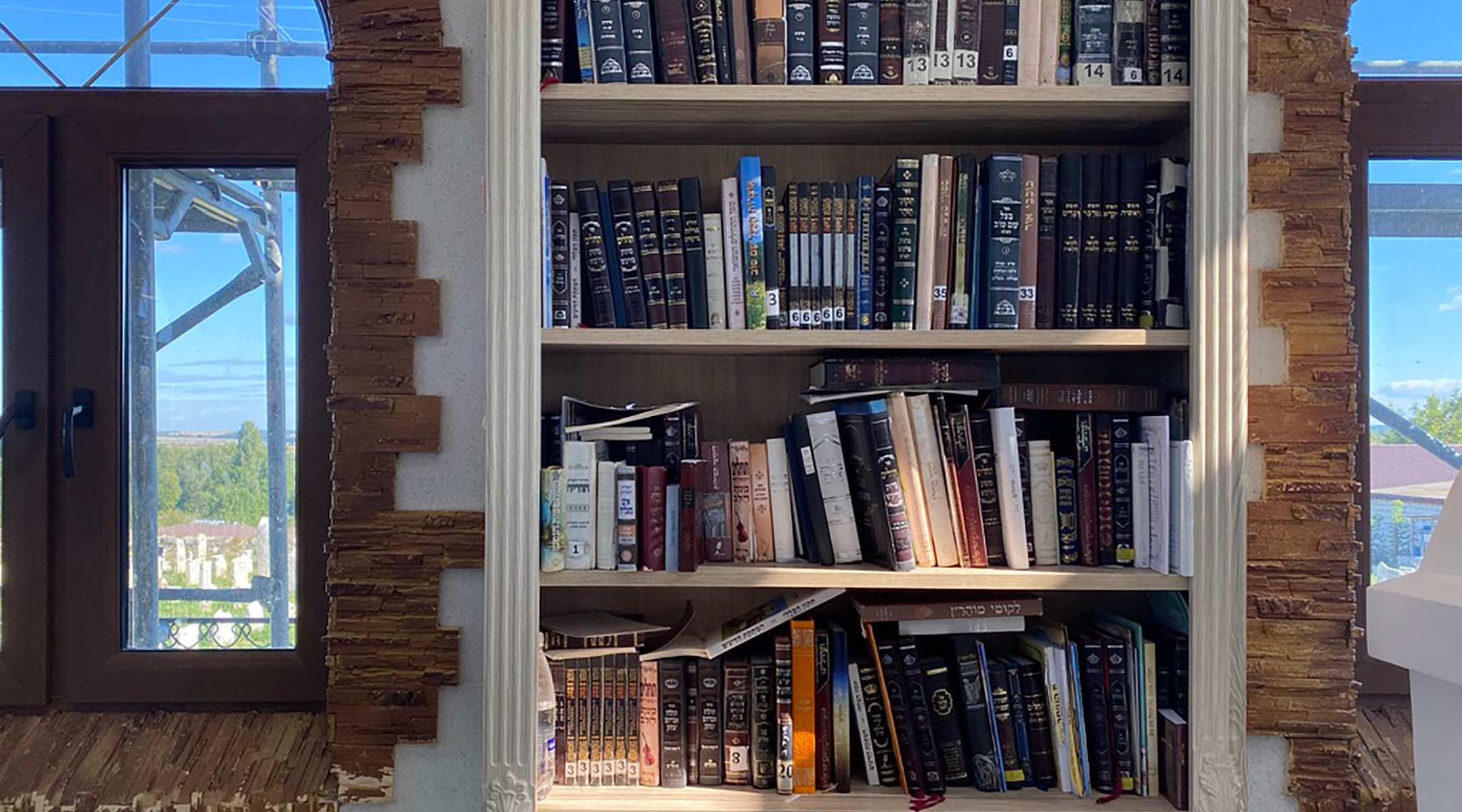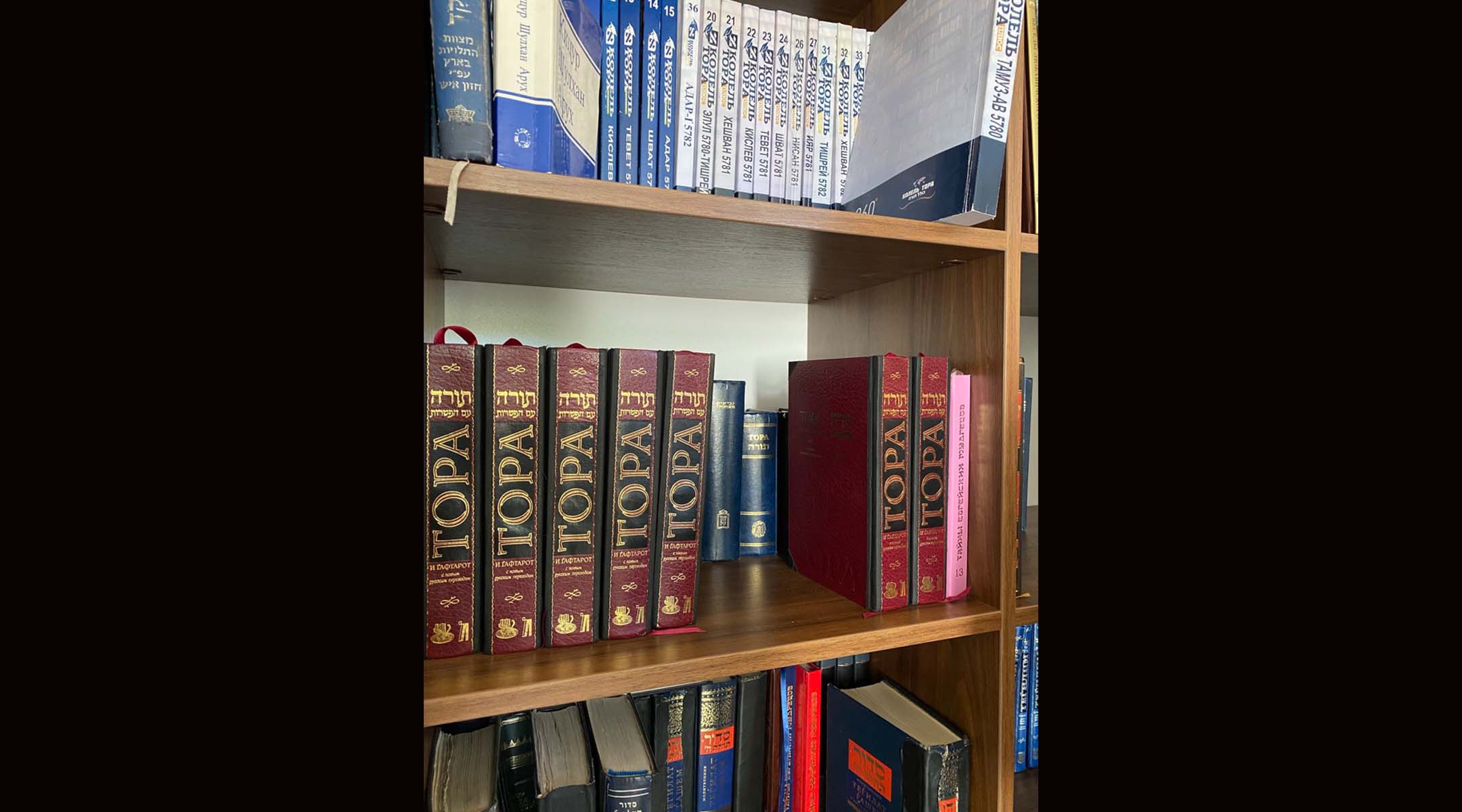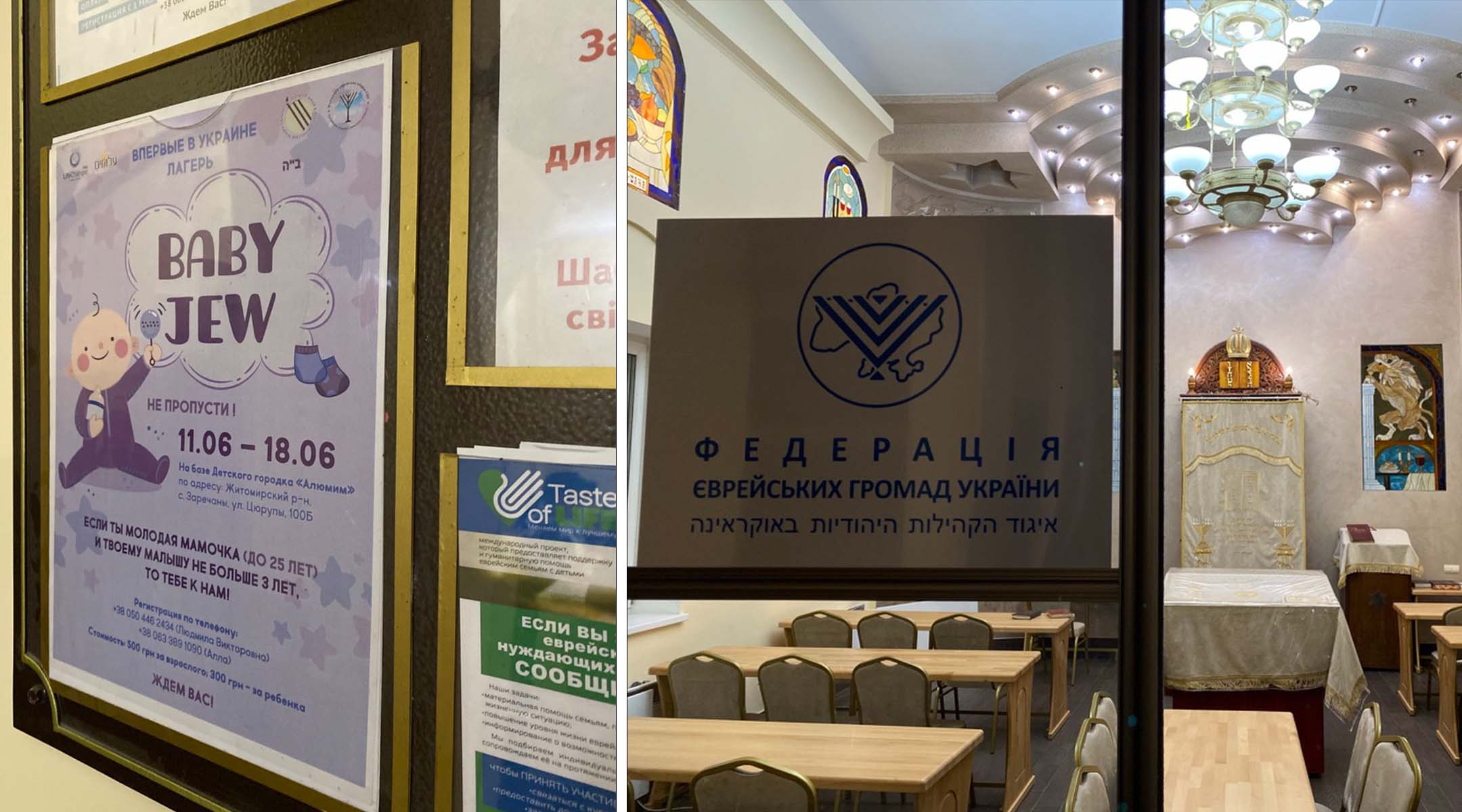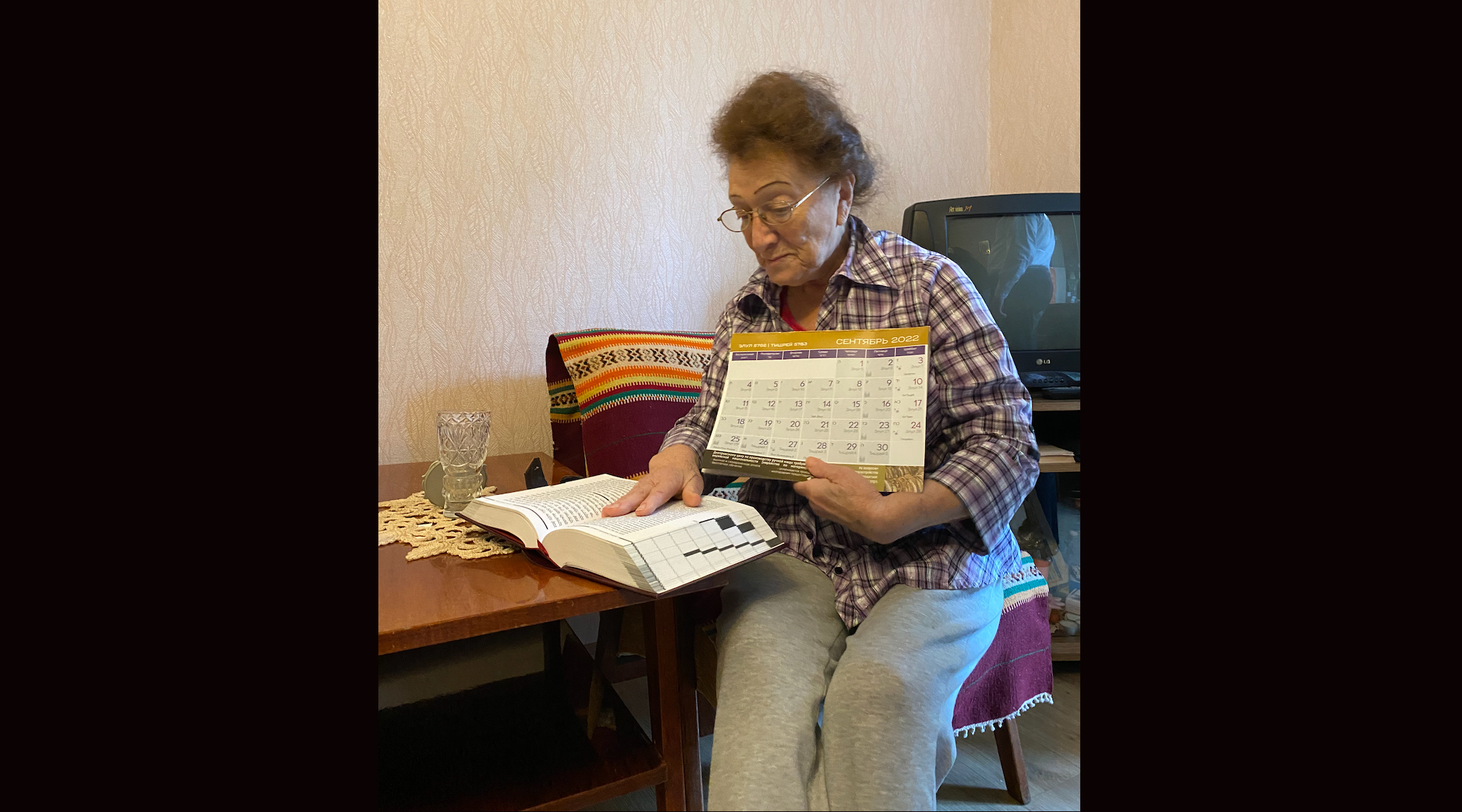Ukrainian Jewish life has always taken place in Russian. Now a race to translate is underway.
An effort is underway to translate Jewish texts into Ukrainian for the first time

A bookshelf at Medzhybizh with texts in both Hebrew and Russian. (Jacob Judah)
LVIV, Ukraine (JTA) – The rabbis sat around a breakfast table, discussing Russia’s war on the country where they work in a mixture of Yiddish, Hebrew and Russian. They named their hometowns as Lugansk, Lvov and Dnepr, the Russian names for Ukrainian cities that have vaulted into international headlines since Russia invaded Ukraine in February.
Although they were focused on Ukraine’s progress in the fighting, the rabbis uttered not a single word in Ukrainian. How could they? Like the vast majority of Jews in Ukraine, none of them speaks the country’s official language.
Russian has long been the first language for a wide swath of Ukrainians, including the majority of the country’s Jews. But after the Russian invasion, many Ukrainians decided they wanted to speak less Russian and more Ukrainian. Many Jews, similarly horrified by the sight of thousands of Russian soldiers pouring over Ukraine’s borders and wishing to demonstrate their Ukrainian bonafides, have made the same choice — even as it means disrupting a long linguistic tradition.
So when the rabbis’ successors meet for pancakes and sour cream, they will be far more likely to introduce themselves as the rabbis of Luhansk, Lviv and Dnipro, the Ukrainian names for their hometowns that have become the standard in English. They will also likely be able to hand their students and congregants Ukrainian-language versions of central Jewish texts that simply do not exist now.
“Many of my friends say that they are embarrassed to use Russian as a language. They say that we are Ukrainian Jews, and that Russia is a terrorist country fighting us and that we shouldn’t use their language,” said Rabbi Meir Stambler, from Dnipro. “Others say that [Russian president Vladimir] Putin doesn’t own the Russian language. It is an issue.”
He added, “This is something that people are discussing all the time.”
A decade ago, half of Ukrainians said they spoke Russian as their native language. That number has declined to 20%, fueled in part by resentment over Russia’s aggressions in Crimea, a contested region that it annexed by force in 2014. But Jews have remained predominantly Russian-speaking, even in parts of western Ukraine where Ukrainian has long been the dominant language. (Russian and Ukrainian are related linguistically, but their speakers cannot understand each other.)
Russia’s war on Ukraine has Ukrainian Jews playing catchup. Stambler, who heads the Federation of Jewish Communities, a body affiliated with the Hasidic Chabad-Lubavitch movement that operates a network of 36 synagogues around Ukraine, offers a stark prediction: “Within 10 years, every Jew in Ukraine will speak Ukrainian.”
The dominance of Russian among Ukraine’s Jews, who numbered in the tens of thousands before the war, has deep roots.
“The historical trajectory of Jews in what is now Ukraine led them in the 19th century to adopt Russian rather than Ukrainian,” says historian Natan Meir, a professor of Judaic studies at Portland State University. “That was because Ukrainian was perceived as a peasant language that did not have any high culture associated with it, and because there were no economic advantages to adopting Ukrainian at the time.”
Now, the upside of switching to Ukrainian — demonstrating a national allegiance during a time of war — couldn’t be clearer.
“Jews feel quite integrated into Ukrainian society, but a shift, even if it is a gradual shift, to Ukrainian is going to make that more tangible than ever,” Meir said, calling the Russian invasion “absolutely game-changing” for Ukrainian Jews. “They will be perceived even more strongly than they have been as being wholly Ukrainian and part of the fabric of Ukrainian society.”
Most Ukrainian Jews, especially those educated since the collapse of the Soviet Union, can now speak some Ukrainian. But their ability often depends on where they grew up: Many Jews in traditionally Russophone cities such as Odesa, Dnipro or Kharkiv can struggle with the language, while their grandparents often cannot speak it at all.

“Not more than 20% were Ukrainian-speaking at home,” says Stambler. “Take President [Volodymyr] Zelensky. He knew Ukrainian, but he didn’t speak it at home, and he had to polish it up when he became president.”
It will not be simple for the Jewish community to suddenly switch to Ukrainian, the most widely spoken European language without a standardized translation of the Torah.
Two years ago, a team of translators working in Israel, Austria and Hungary began working to produce Ukrainian-language Jewish texts. But before the Russian invasion, the effort had so far produced only a Ukrainian book of psalms, or tehillim.
In May, two months into the war, a decision was made to accelerate work on a daily prayer book. A Torah could follow.
“The chumash is difficult,” said Stambler, who oversees the half-dozen-strong team of translators from his base in Dnipro, using the Hebrew word for the printed form of the Torah. “We are working on it.”
While translating sacred texts can take years, other changes have come faster. The leaflets, brochures and calendars that are a fixture at any Jewish center in Ukraine were quickly swapped out Russian for Ukrainian, at least at the federation’s headquarters. Before February, these had often been produced and printed by Russian Jewish communities and shared with those in Ukraine, for simplicity’s sake.
“This differentiation from Russian Jewry is going to be huge,” said Meir, the historian. “Up until this point they have essentially formed one linguistic and cultural space that all Jews, whether they were in Ukraine, Russia or Belarus could move freely between.”
Now, the ties between those communities are both logistically complicated to maintain — trade routes have been ruptured — and also potentially a liability at a time when anyone in either Russia or Ukraine showing an affinity for the other country can face suspicion or penalties.
“This shift, if it actually happens, is going to be marking out a totally new cultural space for Ukrainian Jews and almost a declaration of independence,” Meir said “Or at least that is the aspiration, because there is so much of their heritage which is still based in the Russian language that it is going to be a long time before they can fully separate.”
That separation process, which began to take shape most clearly after 2014, has quickened. “We started doing things ourselves,” said Stambler. “We used to do about 20% in Ukrainian for the Jews in western towns like Lviv, Ivano-Frankivsk and Uzhhorod, but we are making a much stronger push now.”
He estimates that some 75% of material being distributed to Ukrainian Jewish communities by the Federation of Jewish Communities was in Ukrainian by September, up from 20% to 35% in January.
Young rabbis who come from the United States or Israel to serve small Jewish communities across Ukraine now say that they have had to add Ukrainian alongside their Russian classes.
“I began with Russian,” said one of those rabbis who works in Vinnitsya, until he decided over the summer that he had to learn Ukrainian. “I realized that I had to learn Ukrainian because I needed it on the street. I needed it to speak with the government and with the media.”

Some Ukrainian Jews are voting with their voices.
“My whole life, I spoke only Russian,” said Olha Peresunko, who before the war lived in Mikolaiv in southern Ukraine. “But after the 24th of February I am speaking only Ukrainian.”
Peresunko was speaking outside a Lviv synagogue this fall, where she and other refugees were waiting for food parcels. She had fled Mikolaiv, which has sustained repeated assault by Russian troops, for Lviv with her mother and two children while her husband is on the frontlines.
Her children are finding it hard to adjust to the exclusive Ukrainian environment in Lviv, but she is confident that they will make the shift. “They will speak Ukrainian as their first language,” Peresunko said.
Exactly how much the shift to Ukrainian will change local Jewish communities is a matter of debate. Rabbi Shalom Gopin, who fled to Kyiv in 2014 from his home community in Luhansk, an overwhelmingly Russophone city seized by Russia-backed separatists at that time, said he, too, believes that Ukrainian will displace Russian as the lingua franca of Ukrainian Jewry.

“They are starting to slowly speak Ukrainian,” he said. “It is no problem. There are lots of Jews in America who speak English. We live here, and we speak the languages of the places that we live. It is normal.”
But Gopin said the linguistic shift “means nothing” amid other issues facing Jews in Ukraine, where Russia’s war is threatening to undo 30 years of Jewish community building, largely though not exclusively led by Chabad, Gopin’s Orthodox movement.
“The problem for the Jews of Ukraine is not language,” he said. “It is about how much they are going to synagogue, or how many children are going to Jewish schools, not about what they are speaking.”
Natalia Kozachuk, 45, a Jewish businesswoman in Lviv, sees only upside to shedding Russian, her native language. She has started to speak to her children only in Ukrainian.
“It will be hugely positive if Jews speak more Ukrainian,” Kozachuk said. This is the only way that Jews can truly “learn more about the Ukrainian people,” she said, “about their history and the positive qualities and strengths of Ukraine.”
“Only good can come of it,” she added. “We will understand each other better.”
This article originally appeared on JTA.org.
A message from our Publisher & CEO Rachel Fishman Feddersen

I hope you appreciated this article. Before you go, I’d like to ask you to please support the Forward’s award-winning, nonprofit journalism so that we can be prepared for whatever news 2025 brings.
At a time when other newsrooms are closing or cutting back, the Forward has removed its paywall and invested additional resources to report on the ground from Israel and around the U.S. on the impact of the war, rising antisemitism and polarized discourse.
Readers like you make it all possible. Support our work by becoming a Forward Member and connect with our journalism and your community.
— Rachel Fishman Feddersen, Publisher and CEO




























